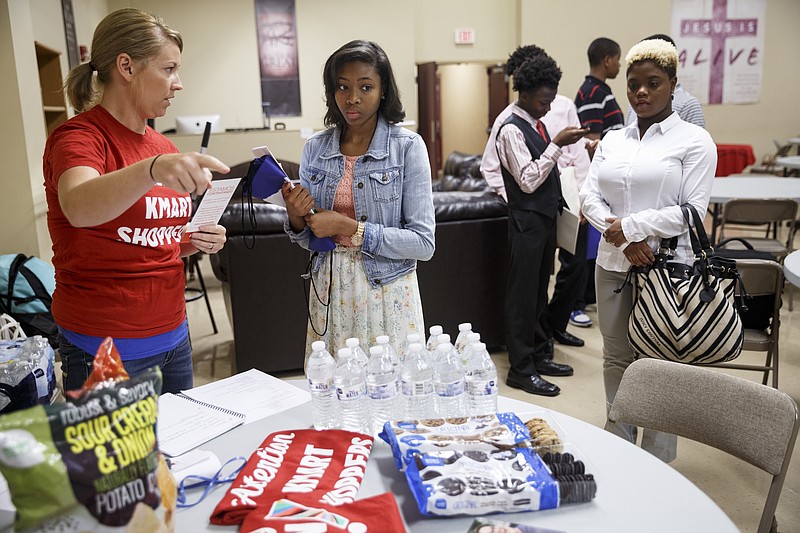Photo Gallery
A Hand Up: Local nonprofit packs out job fair to make dent in high percentage of disconnected youth
Cities like Chattanooga are paying a high price for their ranks of aimless youth, but last week a local nonprofit made a small dent in the number of teens without either work or educational prospects.
Seventy local teenagers registered to attend Success Ready, a two-day training and career fair hosted by First Things First, which educates individuals and families about healthy relationships. Organizers said demand for the job fair was so high that every spot was filled and plans are already underway for a repeat.
"We've been blown away by the response," said Julie Baumgardner, president and CEO of First Things First. "We are excited to guide these teens as they begin their career journey. They truly are the future of our community."
More than 20 businesses, including Ruby Falls, Rock City, Kmart, Zaxby's and Home Depot, participated in the two-day event, which was held at New Covenant Fellowship and began with a full day of training on the job application process. Several teens were hired on the spot, said Tonya Rooks, one of the event organizers. Many others left having completed applications and interviews for work.
"They wanted to work. They wanted to earn money. They wanted to save their money. That is incredible to me," said Rooks. "Someone is at home caring about what happens to their kid."
Youth unemployment in Hamilton County is down from its peak after the Great Recession. Data from the Tennessee Commission on Youth and Families shows unemployment among youth in the county fell from 26.1 percent in 2011 to 12.4 in 2015.
However, the Chattanooga metro area still has one of the highest percentages of disconnected youth in the U.S., a calculation by the nonprofit think tank Measure of America using U.S. Census Bureau data.
Among the top 100 most populous metro areas in the country, the Chattanooga metro area ranks 84th, with 16.8 percent of youth ages 16 to 24 years old neither in school nor working. In this ranking, Chattanooga fared worse than Detroit, Chicago, Boston, Minneapolis, Pittsburgh, Baltimore and Los Angeles.
Researchers have studied the issue of disconnected youth, as well as the current state of economic mobility in America. They argue, with much data to back them, that the problem is a result of class- and race-based segregation that remains a fixture in Southern states like Tennessee and continues to trap disadvantaged youth in dangerous neighborhoods and poverty-burdened schools.
A study released last year by Harvard University and the University of California at Berkeley showed that, while many American cities face the dynamics of swelling poverty, rising income inequality and a sharp increase in the number of single-parent families, they vary when it comes to providing escape hatches for children hoping to leave poverty behind.
Hamilton County, according to the study, was one of the worst places in the country for a poor or middle-class child to grow up.
So connecting young people who have grown up in financially strained families and been isolated in pockets of deep poverty to those in the middle class with links to jobs and opportunity is a crucial step toward addressing the crime and welfare cost associated with disconnected youth, experts argue.
"Disconnected youth are cut off from the people, institutions and experiences that would otherwise help them develop the knowledge, skills, maturity and sense of purpose required to live rewarding lives as adults," reads a recent report by Measure of America, a project of the Social Science Research Council. "And the negative effects of youth disconnection ricochet across the economy, the social sector, the criminal justice system and the political landscape, affecting all of us."
An analysis by the group revealed that in 2013 alone, the direct costs of youth disconnection amounted to nearly $27 billion in federal spending nationwide.
Around half of the youth who attended Success Ready came from low-income households, Rooks said, and some were learning for the first time about the importance of the first impression. They practiced handshakes, she said, and talked about basics like eye contact.
"The kids were really nervous the second morning," Rooks said. "But they came in there looking good. They listened."
Contact staff writer Joan McClane at jmcclane@timesfreepress.com or 423-757-6601.

